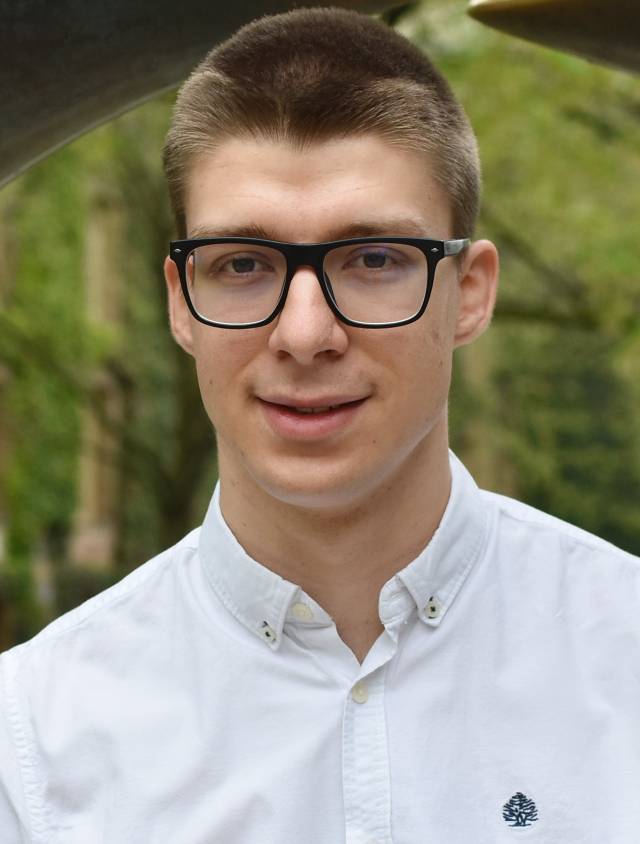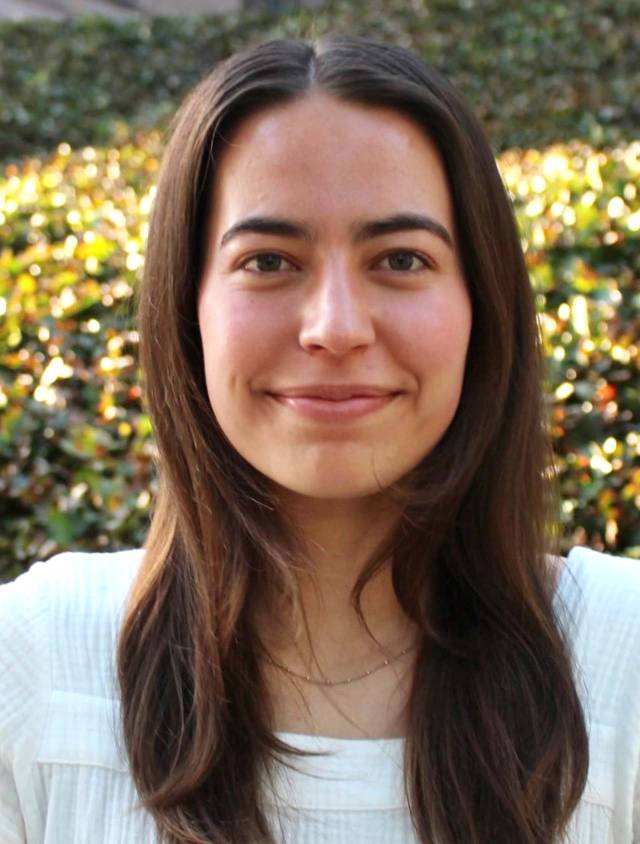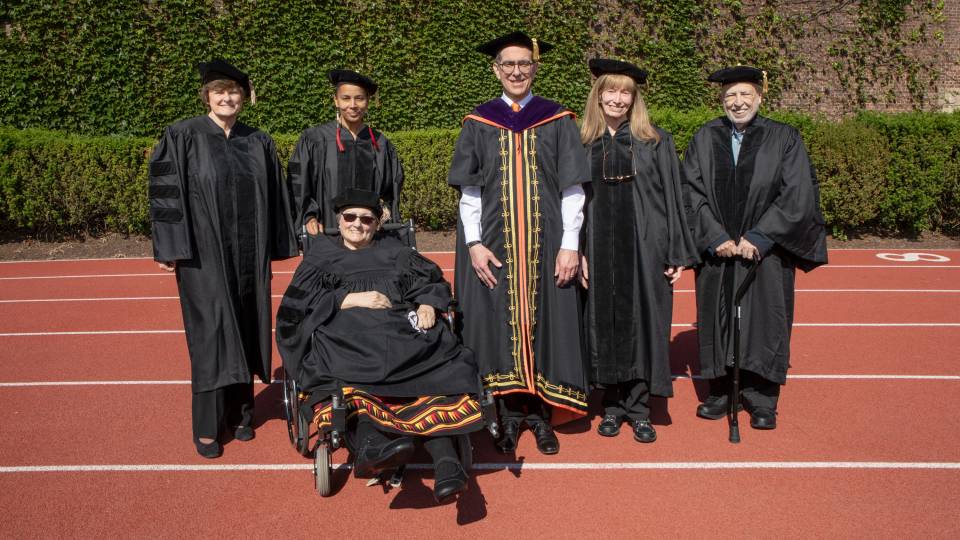Aleksa Milojević, a mathematics major from Belgrade, Serbia, has been selected as valedictorian of Princeton’s Class of 2023. Annabelle Duval, a history major from Rhinebeck, New York, was named salutatorian. The Princeton faculty accepted the nominations of the Faculty Committee on Examinations and Standing at its April 24 meeting.
Commencement for the Class of 2023 will take place at Princeton Stadium on Tuesday, May 30. Milojević and Duval are expected to give remarks at the ceremony.
Aleksa Milojević

“Aleksa’s undergraduate research efforts in the mathematical field of combinatorics contain solutions to some open problems that leading researchers would be proud to have produced,” said Peter Sarnak, Princeton’s Eugene Higgins Professor of Mathematics and a professor at the Institute for Advanced Study.
Milojević has won several of Princeton’s most prestigious awards, including the Class of 1939 Scholar Prize, awarded to the junior with the highest academic standing for all preceding coursework; the Andrew H. Brown Prize, awarded to outstanding juniors in mathematics; the Shapiro Prize for Academic Excellence (twice); and the Freshman First Honor Prize, awarded to two students in recognition of exceptional achievement.
He has written three papers, including one that “essentially settled” a recent problem Noga Alon and two other mathematicians had posed, said Alon, a professor in Princeton’s Department of Mathematics and the Program in Applied and Computational Mathematics. Alon also oversaw Milojević’s junior papers, which he said “demonstrated impressive originality, independence and technical ability.”
While some scholars might take umbrage at having a question tackled — successfully — by an undergraduate, Milojević and Alon continue to have a warm working relationship.
“I don't think there is much ‘ill will’ in math, at least the people I interact with,” Milojević said. “They usually ask questions that they care about, and they like to see them solved.”
Milojević recalled an incident his junior year when he posed a question after a combinatorics seminar that the speaker couldn’t answer. Late that night, he got an email with the answer from Alon, who’d been at the seminar with him. Milojević was touched by the gesture: “The question wasn’t addressed to him, but he thought about it and wanted to reach out to tell me the answer. It was very unexpected, and it just showcased how interested he is in both teaching students and also in the questions themselves.”
For his senior thesis, Milojević used a different branch of mathematics, arithmetic algebraic geometry, to write his own exposition of elementary proofs of the Riemann Hypothesis for curves over finite fields. “This is a very demanding topic for an undergraduate, and I have been very impressed by his mathematical talent, insights and mature approach to this project,” said Sarnak, his adviser. “He is well on his way to writing what I am sure will be an outstanding thesis, one that will be used in future expositions and graduate courses around the world.”
Milojević’s love of mathematics reaches back to his childhood. His grandfather was a math teacher, and his parents are engineers. He excelled in math competitions as a student in Serbia, winning multiple medals in the International Mathematics Olympiad and in the International Physics Olympiad, and he has participated in many outreach efforts at Princeton, including directing the Princeton University Mathematics Competition (PUMaC), a day-long math contest for more than 500 participating high-school students.
He loves sharing his joy in math. A member of Mathey College, Milojević remembers a moment when a neighbor was struggling with an intro math class and asked for a peer tutor. Milojević offered to help. That student is now a math major and tutoring younger students. “It was very fulfilling to see how they transformed from someone that wasn’t sure they could do math to someone who not only wants to do math but wants to foster it in younger people,” Milojević said.
In addition to fond memories of the department — especially the daily Math Tea in the Fine Hall common room — one vivid memory came from spring 2021, when he and his friends were newly back on campus after the COVID-19 shutdown. The dining halls were still closed, but his friends were determined to celebrate his birthday. “They bought a cake, and we ate it outside, at separate tables,” Milojević recalled. “We were probably freezing — it was mid-March, and I remember it was quite cold — but it’s a very warm memory for me.”
At Princeton, Milojević also took courses on Russian literature and the history of Eastern Europe. “Serbia is not far from Russia,” he said. “Some parts of our culture are similar, and the religion is the same as well, so it was very interesting for me to learn about Eastern Europe from the U.S. perspective.”
He admits the prospect of speaking before his fellow graduates at Commencement is a bit daunting. “Given how diverse the class is, it’s very hard to encapsulate all the perspectives that the students have,” he said.
After graduation, Milojević will head to ETH Zurich, which has one of the foremost math programs in the world, to pursue a Ph.D. in combinatorics.
“He is clearly on track to become a world-leading mathematician, teacher and mentor,” Sarnak said.
Annabelle Duval

Duval began studying Latin in sixth grade and at Princeton has taken courses in Latin literature as well as history and classics courses focused on the late antiquity period. The Princeton salutatorian address is traditionally given in Latin.
In the Princeton course, “Readings in Latin Literature — Roman Women, Reality, and Fantasy,” taught by Melissa Haynes, lecturer in classics, Duval found that the texts dovetailed in a meaningful way with both her history major, where she has focused on women’s history, and the certificate she is pursuing in gender and sexuality studies.
“Essentially every Latin text that I had read before that class centered on the male perspective,” said Duval, who is also proficient in Latin translation. “That class sparked an interest in bringing to light women’s voices throughout history.”
Duval is particularly passionate about Latin poetry, and one of these texts was Book III of Ovid’s poem “Ars Armatoria.” While Books I and II are about romantic tips for men, Duval said, Book III is written for women. “Ovid brought me into the life of Roman women more than most other texts I had read at that point.”
Her senior thesis, “Politics in the Clinic: Reproductive Health Services and Legal Strategies in The Association to Repeal Abortion Laws, 1966-1973,” expands on her interest in the history of feminism in the U.S., sparked her sophomore year when she took “Gender and Sexuality in Modern America,” taught by Margot Canaday, professor of history, who is her thesis adviser.
After graduation, Duval will be working in Brooklyn as a paralegal at the U.S. Attorney’s Office in the Eastern District of New York in the Environmental Justice and Enforcement section, before pursuing law school.
Duval was awarded the Shapiro Prize for Academic Excellence for the 2020-21 academic year; the William Koren, Jr., Memorial Prize in History; and the Stone/Davis Prize Fellowship, given for a senior thesis project.
A member of Mathey College, she is a head fellow at the Princeton Writing Center, and a former associate features editor for The Daily Princetonian. She is a leader trainer for Princeton Outdoor Action and a member of the field hockey club, serving as co-president during her sophomore and junior years.
Duval said one of her most vivid memories of her time at Princeton took place at the beginning of spring semester 2021, as students returned after nearly a year away due to the pandemic to remote classes and restrictions on social gatherings on campus. After a major snowstorm one night, she said, “a few friends and I got some big pieces of cardboard from the recycling and went sledding down the Whitman hill. We had a ton of fun, and it reminded me that we can create our own adventures out of any situation.”























